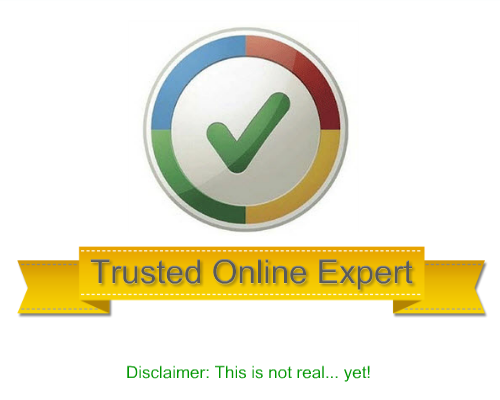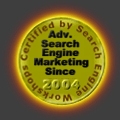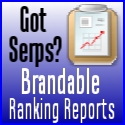 Look how old this is!
Look how old this is! I post at SearchCommander.com now, and this post was published 12 years 1 month 16 days ago. This industry changes FAST, so blindly following the advice here *may not* be a good idea! If you're at all unsure, feel free to hit me up on Twitter and ask.
I’m pretty sure it was an ancient SEO Rockstars episode on Webmaster Radio with Greg Boser and Todd Freisen where I first heard Greg use the phrase
“…that’s what I would do if I were Google…” to sum up a point he was making.
That was one of the best pieces of SEO advice I’ve ever heard, and to this day I’ve continued to base my own thought process, conjecture and educated guesses on what Google will do in the future on that premise.
Google acts in their own self interest, so I try to put myself in a position to “think” the way Google would. How can they fight anchor text manipulation? How can they fight low quality content showing up in the SERPs? How can they make end users happy? How can they generate more money?
Keeping that in mind, I’ve put together my own list covering some SEO fundamentals, some “not so fundamentals”, and a few of my own “predictions” for 2014 that may or may not come true this year, but I’d bet they will some day.
Title Tags
The title is usually the headline that appears in the search results, (unless Google decides to change it), and it should be unique for every single page. That hasn’t changed, and likely never will.
What HAS changed though is Googles own recommendations, quietly updating their Webmaster Guidelines on title tags last year to recommend that you put your business name first, followed by a colon, then some unique component specific to that one page.
Google may even choose to do it for you by rewriting your titles and when they do, your business name always comes first.
So why don’t I comply with their recommendation? Because I don’t WANT to, that’s why not. Maybe I want my headline in the SERPs to read “Exactly What I Want | My Company Name”, so Google, just leave my !$%king title tag alone please.
In my opinion Google has no right to modify it – none – but they do whatever they damn well please, and often they’ll change it to “My Company Name: Whatever Google Wants” and although I hate that, to be honest, if I had a bias for brand names, that might be what I would do if I were Google….
Keyword Tags
I’ve never given up recommending the use of meta-keyword tags, just a couple, in order to “uniquify” every page. It only takes a few seconds, and it shows you care.
Over the years we’ve gone from the keyword tag being vitally important and easy to manipulate rankings with (anyone remember Alta Vista?), to completely unimportant, but I think we began to see the pendulum swing back ever so slightly before the introduction of universal search.
We know that the KW tags get indexed, because stuffing them can still get you into trouble, so I think having a couple of unique and relevant keyword tags on every page may someday be a ranking factor again. That’s what I would do if I were Google…
Description Tags
Description tags should be unique to every page, and they should be written like a classified ad, in order to entice the SERP viewer to click through to the page.
That’s pretty much a given, and if you’re a WordPress user, there are a myriad of plugins that will automatically take the first 155 characters of your post and turn that into the description tag… voila! Instantly unique for every page.
That’s as good as it gets, right? After all, Google says they do not use the description tag for ranking, so why put forth any extra effort?
My own theory though, is that if someone takes the time to write a thoughtful description for every page, and is not auto generating it from the first paragraph of the content on their webpage, might that not be a trust signal to Google, and might that not cause them to rank a little higher? That’s what I would do if I were Google…
Image Alt Attribute
Gotta use ’em. The ALT attribute is intended as a method of providing alternative content for viewers that cannot see the image. The ALT tag should describe the image, not be overstuffed with keywords. Remember, screen readers for the visually impaired will actually read your ALT text out loud, so be kind to them.
The search engines have come full circle on this one over the years, from being an important part of the ranking algorithm, to “they don’t matter”, and the pendulum swung back to mattering again a few years ago.
I’ve never stopped using them, and recommend that you don’t stop either. Using good non-stuffed relevant ALT tags should help you rank better. That’s what I would do if I were Google…
Image Title Attribute
I’ve never read or heard of a single expert claiming that the image title attribute can help rankings, but I use them… Why the heck not?
The image title should provide additional information and follow the rules of the regular title: it should be relevant, short, catchy and concise
It only takes a second to add one, and in keeping with my description tag theory, if someone takes the time to write a thoughtful title attribute for their image, might that not be considered an added trust signal? That’s what I would do if I were Google…
* Note – WordPress has been “broken” for some time now. When you add an image to a page or post, and you add a title and alt attribute at the same time, once you insert it, the title is gone. Irritating, isn’t it?
H1 Tags and other Headers
Most SEO’s seem to agree that having an H1 tag is moderately important. For a while they were VERY important, and people began to abuse them, and although in 2009 Matt Cutts said having more than one was OK, I think it’s stupid.
I still prefer to use only one H1 per page, closely related to the title, and in WordPress I like to see it as “the headline” on a page. Subsequent sub-headings in a page are fine, but an article should have one major headline. Why? Because that’s how newspapers and magazines have been laid out for hundreds of years, and it just makes sense.
Using an H1 as the main headline, and then using H2 and other smaller headlines throughout the page should make you rank better. Well, it *does not* but that’s what I would do if I were Google…
On Page Word Count
While I believe in the brevity of thought getting your point across, don’t make things too short. I typically advise a 400 word minimum for any page, and that’s not including the navigation items, sidebars, footers, etc.
As a rule I think it’s hard to create content of any substance without enough words, so put forth the effort. All things being equal, I think the longer more in-depth article will outrank the short one.
Does that help you rank better? I’m not sure, but that’s what I would do if I were Google…
Keyword Density
Keyword density isn’t a phrase I’m even thinking about anymore, you shouldn’t be either. Just write for the user and not for the search engines! KW Density has sort of turned into thinking about “relevance density” and that’s going to get stronger.
Use your phrase once or twice but don’t overdo it. There’s no magical percentage you should hit. On the off chance you DO have or use a tool that shows you the percentage though, keeping it under 3% would be my advice. Read it out loud to yourself. If it sounds stupid, then it IS stupid. That’s what I would do if I were Google…
LSI – Latent Semantic Indexing
There was buzz phrase tossed around by SEOs in the past that I first mentioned back in 2007, and although this is dumbed down heavily, my explanation of the concept was basically to “use synonyms in your content”, because someday we knew it would matter, and they have now for some time.
While examples of pages that rank for a phrase without ever having used that exact phrase anywhere on the website are rare, I believe that the recent Hummingbird algorithm is exactly the sort of change that’s going to make this happen more and more, as Google now understands “conversational search”.
This goes back to what I said earlier about “relevance density” and I think it will continue to get better over time, and using the specific phrase will matter less and less. That’s what I would do if I were Google…
Image Geo Tagging
If you insert a piece of clip art into an article it may look better to the viewer, but using an image that’s already on dozens or hundreds of websites doesn’t do much for boosting your trust or credibility.
However, using an original image that you’ve taken or created yourself does enhance your reputation as a content creator, and I’ve long believed that’s a better way to go.
Taking that a step further, by snapping those images with a cell phone that has geo tagging turned on will automatically enhance that image further by encoding the date, location and even the weather to the pictures you use.
Will using geo-tags help you rank better? Mope, probably not yet, but that’s what I would do if I were Google…
HTML Validation
Long ago, Matt Cutts said having pages that validate do not get a rankings boost.
On that page there’s a video he made where he explains why Google itself doesn’t even validate.
A while later, he made another video , this one with Danny Sullivan, where both of them explain why it doesn’t matter, and confirming that it doesn’t.
In keeping with anything else I’m writing here, how can it not be taken into account? Even the person who asked the question said “I’m confused…” because it seems like it might be important, doesn’t it?
If you’re really trying to improve the user experience, and you take the time to validate your site, then why shouldn’t that should mean more credibility and trust, and maybe lead to a ranking boost?
I’ve always had a mental image of the Google Algorithm as a giant wall with hundreds and hundreds of dials that are ranking factors. Each one has an on off switch and a dial w/ digital readouts, and think at least one of those dials is for .html validation.
The fact that it’s been switched to ” off” for a long time can’t possibly be permanent, can it? Someday, I’m pretty sure they’ll turn on and start “dialing up” .html validation in the same way that they’re doing it for social signals.
When they do flip the switch , just like other things, I also think Matt will again say, “…it’s been turned on for a while now and you almost nobody noticed.” That’s what I would do if I were Google.
Google Authorship
It was November of 2012 when , I first wrote about a new sort of paid links coming from Google, and over 2013 this same basic sentiment has been echoed by plenty of people.
Google will crawl your site and read what you have to say, but they’ll decide if you’re important and knowledgeable enough to rank for saying so, based on who you are and what you’ve done in the past. Sort of like the way anyone has any credibility in real life!
However, who you are isn’t nearly as important as who the world thinks you are, and while they may not be doing so yet, I think we’ll see Google begin to factor authorship as a ranking factor this year, and when they do, I also think they’ll admit that they’ve been doing it for some time already.
Keep in mind though that it’s not just the number of circles those authors are in that will help you rank with these sort of “guest posts”. It’s the specific subject matter for which they’re considered experts. I may be in over 2000 Google + circles, but hiring me to wite for your sewing blog probably won’t do you any good.
As companies seek to hire established content producers who can bring their high Author Rank with them, I’m sure we’ll continue to see more and more services pop up like like these guys where you can find the influencers in your industry, and like Bill Hartzer’s Authpost which should eventually allow you to “buy authorship”.
Having established experts write for your company will help you rank better. I could be wrong, but that’s what would do if I were Google.
Publisher Tag
I like to see the rel=publisher tag on the home page of your website, and on your product and informational pages, and have it linked back to your company’s Google+ page. Why? Because it exists, and because some day I believe your logo will be displayed in the SERPs if you do. Why else would the rich snippet tester validate and show your logo if you use the rel=”publisher” tag?
Will it happen this year? Will it be a paid option the way Yahoo did for a while back in 2007? I don’t know, but if I wanted businesses to embrace Google+ even more fully than they already have, that’s what would do if I were Google.
Site Speed
In my Pubcon 2009 presentation on web hosting, I “predicted” that site loading speed would someday be a ranking factor.
The very next day, during Matt Cutt’s presentation, he announced that site speed would be a factor soon, and in April of 2010 it became a fact, and Google began factoring in site speed as a ranking factor. Was I some sort of an SEO heretic? Hardly…it just made sense.
In 2014, as we’re heading into the year that desktop internet use is likely to be surpassed by mobile, I think this is more important than ever. People HATE slow sites, and they hate them even more on their phones.
There are so many tools to help us make sites perform faster that there’s no excuse for a slow site. That’s why image size, the number of images, overall page size and even compression have been a part of my own on-page SEO review tool since late in 2007.
Today I believe you absolutely MUST take the necessary steps to make your site mobile friendly and fast loading, even if it’s something as simple as running your images through some compression tools, or you may not be anywhere near the front page for anything someday in the future. That’s what I would do if I were Google
Google Taking Away More?
It was the end of 2012 when Google officially went after services that were providing us with rankings reports, like Authority Labs and Raventools.
It’s always been against Google’s TOS to scrape, but they never enforced it until last year, which they did by threatening to pull these companies access to the legitimate Google API’s that they need to do business. (Kudos to Moz for not caving in and continuing to provide ranking reports).
I don’t think it’s a stretch of anyone’s imagination to say that I think Google will continue to take more away from us. First it was keywords [Not Provided] for logged in users, then we lost all inbound keyword information entirely.
Just recently I noticed another bit of information withheld, this time inside of Webmaster Tools. While they do hold 90 days of history, a few weeks ago I thought we would get up to 90 days of your “ranking changes” too, but now that’s limited to 30 days.
Some others have said they don’t remember that stretching to 90 days, but regardless, would you not pay to have access to your entire history like Analytics, for everything from crawl history to average rankings? I sure would, and Google could start to charge for that enhanced service any time. That’s what I would do if I were Google.
Next… Trusted Online Experts?
Google has been offering Adwords certification almost since Adwords began, and over time we’ve seen various other “trusted” vendors and services, like Google Trusted photographers and Google Trusted Stores.
How long can it be before Google starts offering their services on a “certification” level, charging for access and providing keyword data, analytics or any number of other essential services only to qualified and “trusted” partners and individuals, perhaps here at Google Partners where they already say this…
Grow your business with the help of a trusted online expert. Search from over 5,000 Google Partners to find the right one for your business
Might this actually be required someday, in order to legitimately (or even legally?) provide others with search marketing services? At first it might be voluntary, like the programs are now. I mean, who wouldn’t want to be “trusted” with a Google badge?
But what about when they start holding back data unless you’re “in the program”? I’m just speculating here, but if they wanted to continue to gain control over the marketing world in the same way they’ve systematically pounded affiliates, and they want to generate some huge revenue in the process, that’s what I would do if I were Google…





















Epic post, Scott. A real SEO “State of the Union.”
Your assumptions and recommendations are spot on, too. Every sentence you wrote in this piece is like gold.
What a great way to start off 2014 man. Great post.
Thanks Garry 😉
Love your comments on the Title Tag. I fall into the same bucket. I know Google is overly emphasizing brand, and has for sometime now, but click through rate and content description is more important to me.
For example, if the first section of the Title Tag was always our brand, someone scanning the SERPs wouldn’t know by our brand name what the page content is about.
Conversely, if you emphasize text relevant to the page’s topic/theme first, anyone scanning the SERP’s will see something related to what they’re searching for and click your link.
Format = Something Related to Page Content | Brand
Simple.
What would Google do has been my mantra for 10 years
Hello Scott! Unfortunately, I believe you are right when you said “Google acts in their own self interest.” They may act like the good guys by always informing everybody that they are doing this and that for the millions of surfers, it is still business and they will still put their selves first.